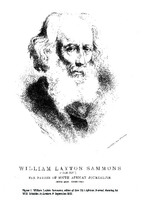| dc.contributor.author | Holdridge, Christopher | |
| dc.date.accessioned | 2011-01-31T12:01:33Z | |
| dc.date.available | 2011-01-31T12:01:33Z | |
| dc.date.issued | 2010 | |
| dc.identifier.citation | Holdridge, C. (2010). Laughing with Sam Sly: The cultural politics of satire and colonial British identity in the Cape Colony, c. 1840-1850. Kronos, 36: 28-53 | en_US |
| dc.identifier.uri | http://hdl.handle.net/10566/206 | |
| dc.description.abstract | This article examines Sam Sly’s African Journal (1843–51), a literary and satirical
newspaper published by William Layton Sammons in Cape Town. It contends
that the newspaper utilised satire to forge British cultural affinity in the colony, as
well as to encourage and preserve the conservative social boundaries of propriety
and family values espoused by white middle-class colonists. This differed from the
more widely studied position of satire as a subversive challenge to the established
order, with Sammons avoiding sexually explicit, scandalous humour or overt attacks
on personal character. In a period of growing white consensus, the African
Journal’s use of satire in the 1840s formed part of the cultural politics of establishing
bourgeois values through the medium of appreciation of British literature and
popular culture. Satire in Sam Sly’s African Journal thus functioned ideologically
to extend British cultural dominance and affinities, and to preserve and instil white
bourgeois moral codes. Although much satire was shorn of the racial reality of
the Cape Colony, seeking to replicate an impression of metropolitan whiteness,
those satires that focused on race derided the Khoikhoi and Xhosa as incapable of
achieving equality with whites, drawing on growing anti-humanitarian sentiment
in the Cape. The African Journal’s popularity, however, diminished in the face
of the anti-convict agitation of 1848–50, when colonists opposed the landing of
ticket-of-leave convicts from Ireland as an impediment to the goal of representative
government, through petitions and boycotting supplying to the government. Satirising
these measures as a radical betrayal of British loyalty, Sammons’s support
dwindled owing to his criticism of popular feeling. | en_US |
| dc.language.iso | en | en_US |
| dc.publisher | Published by History Department, University of the Western Cape | en_US |
| dc.rights | Copyright author. Issued under a Creative Commons Attribution licence. Readers may copy, distribute and transmit this article as long as full acknowledgement of the author and published source is given. | |
| dc.subject | Satire | en_US |
| dc.subject | Cultural politics | en_US |
| dc.subject | Journalism | en_US |
| dc.subject | British identity | en_US |
| dc.subject | Cape Colony | en_US |
| dc.subject | Cape Town -- History | en_US |
| dc.title | Laughing with Sam Sly: The cultural politics of satire and colonial British identity in the Cape Colony, c. 1840-1850 | en_US |
| dc.type | Article | en_US |
| dc.privacy.showsubmitter | false | |
| dc.status.ispeerreviewed | true | |

